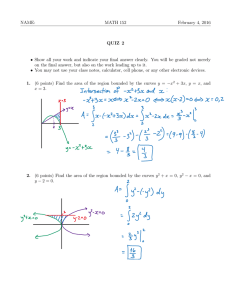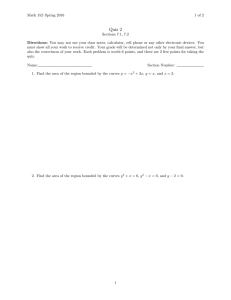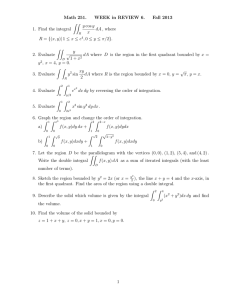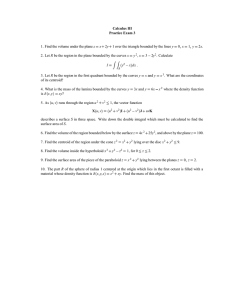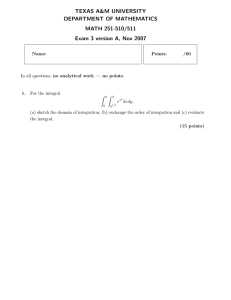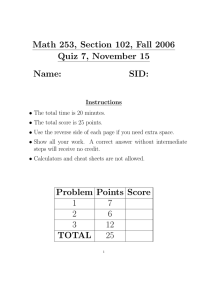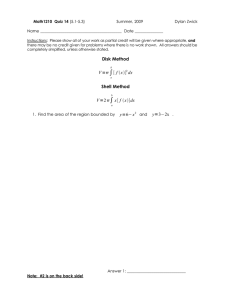Document 11890579
advertisement
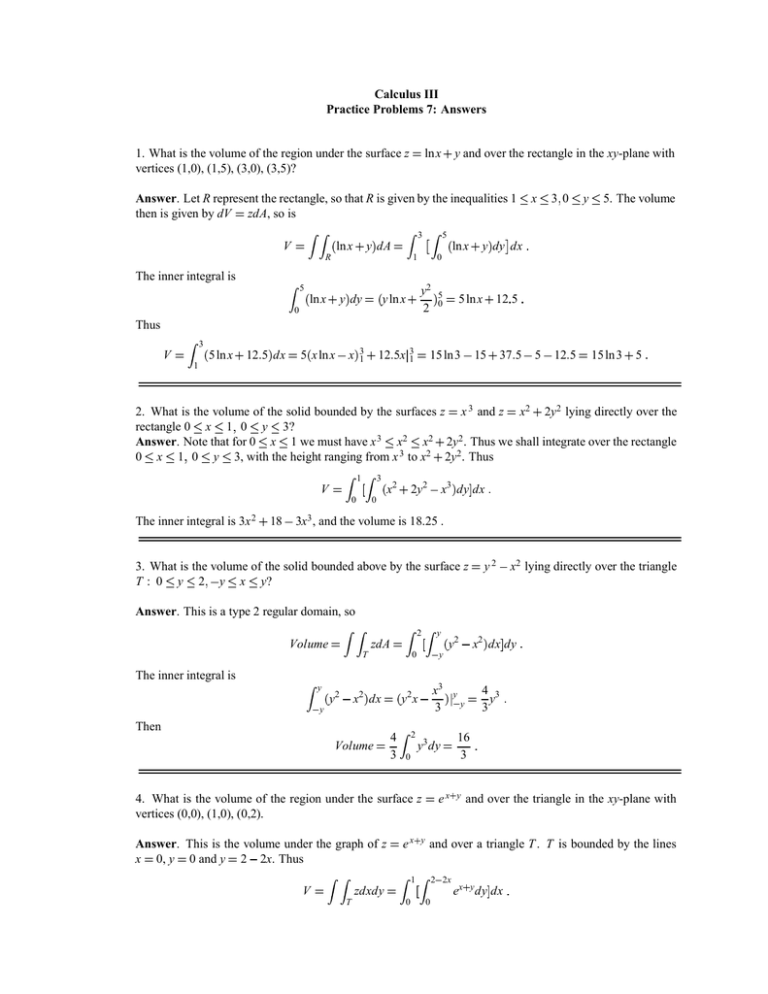
Calculus III Practice Problems 7: Answers 1. What is the volume of the region under the surface z vertices (1,0), (1,5), (3,0), (3,5)? ln x y and over the rectangle in the xy-plane with Answer. Let R represent the rectangle, so that R is given by the inequalities 1 then is given by dV zdA, so is The inner integral is 3 5 ln x R 1 0 2 5 0 V 3 1 5 ln x 5. The volume y dA ln x y dy dx ln x y dy y ln x y 5 lnx 12 5 2 V Thus x 3 0 y 12 5 dx 5 x ln x x 12 5x 3 1 3 1 5 0 15 ln3 15 37 5 5 12 5 15 ln3 5 2. What is the volume of the solid bounded by the surfaces z x 3 and z x2 2y2 lying directly over the rectangle 0 x 1 0 y 3? Answer. Note that for 0 x 1 we must have x 3 x2 x2 2y2 . Thus we shall integrate over the rectangle 0 x 1 0 y 3, with the height ranging from x 3 to x2 2y2. Thus x 1 The inner integral is 3x 2 V 18 3 0 2 x dy dx 2y2 3 0 3x3 , and the volume is 18.25 . y2 3. What is the volume of the solid bounded above by the surface z T : 0 y 2 y x y? x2 lying directly over the triangle Answer. This is a type 2 regular domain, so Volume The inner integral is Then y y y x dx dy 2 zdA T y 0 2 3 2 3 3 3 0 ex 4. What is the volume of the region under the surface z vertices (0,0), (1,0), (0,2). Answer. This is the volume under the graph of z x 0, y 0 and y 2 2x. Thus y y 3 V 2 x 4 x dx y x y 3 3 4 16 Volume y dy y2 2 2 y ex y T 0 y and over the triangle in the xy-plane with and over a triangle T . T is bounded by the lines 1 zdxdy 2 2x 0 ex y dy dx The inner integral is 2 2x ex y dy 0 ex y 2 2x 0 e2 ex x Now we integrate with respect to x: 1 0 e dx e e e2 x 2 x x x 1 0 y 2, x 5. Let R be the region in the plane bounded by the curves x I 2e 1 e2 3 y x dxdy 2y2 . Calculate 2 R Answer. Draw the region described by the curves: x y2 3 x 2y2 PSfrag replacements Integrate first with respect to x along curves y = constant from y 2 to 3 point of intersection of the parabolas: y 2 3 2y2 ; the solutions are y y x dx dy 3 y2 1 I x 2 29 5. y2 x Integrating over y, we obtain I 2 2 . To find the range in y find the 1. Thus 2 y2 1 The inner integral is 2y 3 y2 y2 2y4 6. What is the mass of the lamina bounded by the curves y density function is δ x y x2? Answer. Draw the region described by the curves: 6y2 1 92 x and y 1 x 3 and the x-axis, where the y 1 1 x3 x PSfrag replacements x x y2 3 2y2 y If we insist on viewing this as a type 1 domain, we must split the region into two parts: 1 x 0 0 y 1 x; 0 x 1 0 y 1 x 3 , and integrate dydx. As a type 2 domain, it is easier: the region is given as 1 y 1 3 and integrate dxdy. In the second case, the mass is given by 0 y 1 y 1 x 1 y1 3 1 Mass The integral with respect to dx is 1 x2 dx dy y 1 0 y y 1 3 3 3 Now, to complete the integration, make the change of variable u 1 3 1 ! y" y 1 dy 0 1 3 3 1 1 1 y: u du 3 u 0 1 4 7. A lamina filled with a homogeneous material (the density is identicaly equal to 1) is in the shape of the region R bounded by the curves y 1 and y x 2 . What is its center of mass? Answer. This is the region x̄ 0. Now 1 x 1 x y 1. Call the center of mass x̄ ȳ . Because of symmetry, 4 Mass dydx 2 1 1 3 1 x2 Momy 0 3 5$ # 0 1 1 1 x2 ydydx 4 5 Thus x̄ ȳ 8. Find the mass of the solid bounded by the surface z y 2, where the density is δ x y z x. Answer. Draw the region bounded by the surfaces: &% x 2 y, the coordinate planes and the planes x 1, z PSfrag replacements y y2 x x 3 2y2 y 1 x y 1 x3 x y 1 2 x δ dV Now, over an infinitesimal rectangle of side lengths dx dy, the mass is dM Mass R zδ dxdy 1 2 2 0 ydydx 0 % x ydy 2 x y 2 x 2 x ' 3 3 ! 2 2 1 x 2 x 2 3 1( x x 2 x dx 3 3 5 5 15 2 2 2 0 1 Mass x% x δ zdxdy, so 0 2 3 2 3 3 2 2 0 2 2 3 2 3 2 5 3 1 0 5 2
